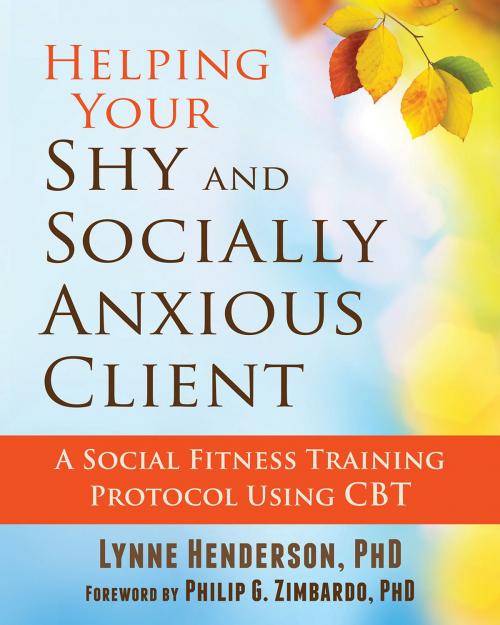Helping Your Shy and Socially Anxious Client
A Social Fitness Training Protocol Using CBT
Nonfiction, Health & Well Being, Medical, Specialties, Psychiatry, Psychology, Clinical Psychology, Mental Health| Author: | Lynne Henderson, PhD | ISBN: | 9781608829637 |
| Publisher: | New Harbinger Publications | Publication: | March 1, 2014 |
| Imprint: | New Harbinger Publications | Language: | English |
| Author: | Lynne Henderson, PhD |
| ISBN: | 9781608829637 |
| Publisher: | New Harbinger Publications |
| Publication: | March 1, 2014 |
| Imprint: | New Harbinger Publications |
| Language: | English |
Helping Your Shy And Socially Anxious Client presents a breakthrough therapeutic approach to treating social anxiety.
In a world dominated by extroverts, being shy or socially anxious can make life especially challenging. And while there is nothing wrong with being naturally introverted, avoiding social contact due to extreme fear and anxiety can be very damaging both mentally and physically.
As a therapist, you understand that avoidance can often make a client’s anxiety worse. But many clients with shyness and social anxiety believe they can never change. In fact, they may strategically adjust their lives to avoid social activities or situations that make them uncomfortable. In a sense, they allow their social "muscles" to atrophy, and in the end may become even more alienated and despondent. There is hope.
Just as physical fitness strengthens the body, "social fitness" can be developed through habit and action. In Helping Your Shy and Socially Anxious Client, shyness expert Lynne Henderson presents the Social Fitness program—a twelve session cognitive behavioral model for clients with shyness and social anxiety. Inside, mental health professionals will learn powerful tools for helping clients strengthen their social skills, track their successes, and learn to cope with setbacks or hurdles.
The techniques described in this manual were developed for the Stanford Shyness Clinic by Philip Zimbardo, and are currently being used by the Shyness Institute in Berkeley to educate therapists and other counselors. Find out more at shyness.com.
Helping Your Shy And Socially Anxious Client presents a breakthrough therapeutic approach to treating social anxiety.
In a world dominated by extroverts, being shy or socially anxious can make life especially challenging. And while there is nothing wrong with being naturally introverted, avoiding social contact due to extreme fear and anxiety can be very damaging both mentally and physically.
As a therapist, you understand that avoidance can often make a client’s anxiety worse. But many clients with shyness and social anxiety believe they can never change. In fact, they may strategically adjust their lives to avoid social activities or situations that make them uncomfortable. In a sense, they allow their social "muscles" to atrophy, and in the end may become even more alienated and despondent. There is hope.
Just as physical fitness strengthens the body, "social fitness" can be developed through habit and action. In Helping Your Shy and Socially Anxious Client, shyness expert Lynne Henderson presents the Social Fitness program—a twelve session cognitive behavioral model for clients with shyness and social anxiety. Inside, mental health professionals will learn powerful tools for helping clients strengthen their social skills, track their successes, and learn to cope with setbacks or hurdles.
The techniques described in this manual were developed for the Stanford Shyness Clinic by Philip Zimbardo, and are currently being used by the Shyness Institute in Berkeley to educate therapists and other counselors. Find out more at shyness.com.















